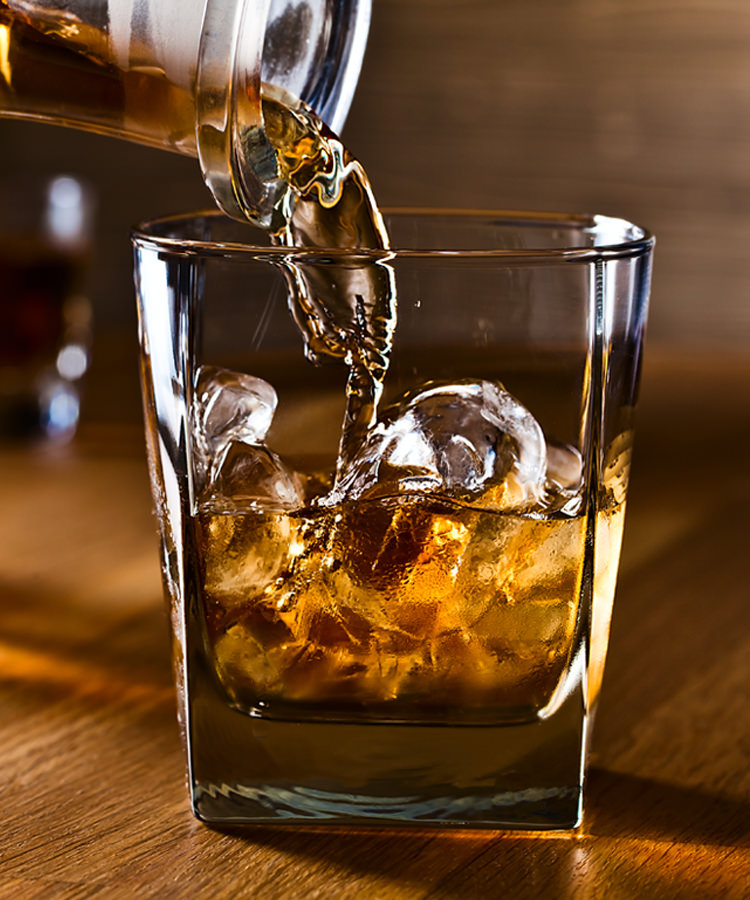Every Saturday Jews across North America make their way to worship and drink whiskey.
Strictly speaking, they are gathering for the specific purpose of prayer; drinking whiskey is just a pleasant way of passing the time with fellow congregants. But the kosher bottlings from prominent whiskey labels, the growth of “kiddush clubs,” and the spread of national events like Whisky Jewbilee suggest that the Jewish love of whiskey is bigger than a few post-service drams.
As many Americans found out during Prohibition, not only does Jewish tradition not frown on alcohol, it actually mandates wine for regular weekly rituals. During the dry years in early 20th-century America, there was an unsurprising uptick in demand for wine for religious purposes, as rabbis became the source of legal alcohol.
Today kosher wine remains a booming business, generating more than $28 million in the United States last year. But American Jews are increasingly reaching for whiskey at Sabbath tables, bars, and major events — and labels like Glenmorangie and Buffalo Trace are happy to oblige.
I first became aware of the extent of this phenomenon in 2010, when I attended the huge New York WhiskyFest at the Marriott Hotel. As the newly coined whiskey correspondent of the Jewish Daily Forward, I was fascinated by the number of Jewish attendees. There were people I happened to know were ethnically Jewish but neither practiced the religion nor worked for the community; and, at the other end of the spectrum, there were a couple of extremely orthodox men with “payos” — the ritual sidelocks — enjoying a wee dram or two. I covered the phenomenon in a piece called, “More Kippahs Than Kilts At WhiskyFest.”
As the years went on, many others took notice. The Jewish Whisky Company, an LLC that specializes in the Jewish market and operates under the Single Cask Nation label, launched Whisky Jewbilee in 2013. It brought 250 whiskey enthusiasts to the West Side Institutional Synagogue in Manhattan, the day before New York’s 2013 WhiskyFest. Since the festival was being held on a Saturday, the traditional Jewish day of rest, many longtime WhiskyFest devotees couldn’t attend. Jewbilee provided an alternative for observant Jewish whiskey drinkers. Jewbilee is now in its fourth year in New York and has launched siblings in Chicago and Seattle.
Scotch is always kosher — unlike wine, which has to be supervised and boiled to be strictly kosher (I know!). Single malt Scotch is a controlled appellation, meaning that it is clearly and legally defined as whiskey made from 100 percent malted barley that is the product of a single distillery, and aged in used wooden casks for at least three years. The purity of the product is carefully controlled and certified to be without adulteration. Barley, water, yeast and that’s it. So it’s usually kosher.
Labels such as Glenrothes, Glenmorangie, Ardbeg, Bowmore, and Auchentoshan are, however, specifically “courting the Jewish consumer by obtaining official kosher certification for certain bottlings,” according to a New York Times article titled, “Whiskey Makers Court the Jewish Market.”
They’re not alone. In 2013, Kentucky’s Buffalo Trace called upon the Chicago Rabbinical Council to kosherize more than 1,000 barrels of product. Bourbon, for those keeping track at home, is not necessarily kosher in the same way as Scotch. New York’s kosher Royal Wine Corporation partnered with legendary Kentucky distiller Wesley Henderson to produce a certified kosher line of his boutique bourbon, Angel’s Envy, that same year. It quickly sold out.
The way I see it, there are a number of historical and contemporary reasons for this phenomenon. For Orthodox Jewish men, whiskey presents a religiously acceptable way to participate in American masculinity. (I would argue that, unfortunately, this ends up stressing gender divides at a time when orthodoxy and all of American society is reckoning with its sexism.)
Jewish whiskey enthusiasts of all denominations and genders, however, might find top-shelf whiskey a socially acceptable way to conspicuously consume luxury and flout our newfound affluence. Our parents may have had to drink well whiskey, but we’re drinking a single malt that no one west of Islay has heard of.
On a broader scale, digital marketing enables whiskey, bourbon, and Scotch companies to target specific communities with niche outreach. There seems little reason for already kosher Scotches to get a kosher symbol except for marketing.
All this has given Jewish drinkers a taste for whiskey and an increasing variety of options with which to slake their thirst. For those hoping to celebrate Hanukkah 5778 — or 2017 if you’re following the secular calendar — with a few chosen drams, I offer “Eight Whiskies for Eight Nights.” Slàinte mhòr agad, l’chaim, and happy holidays to all.
